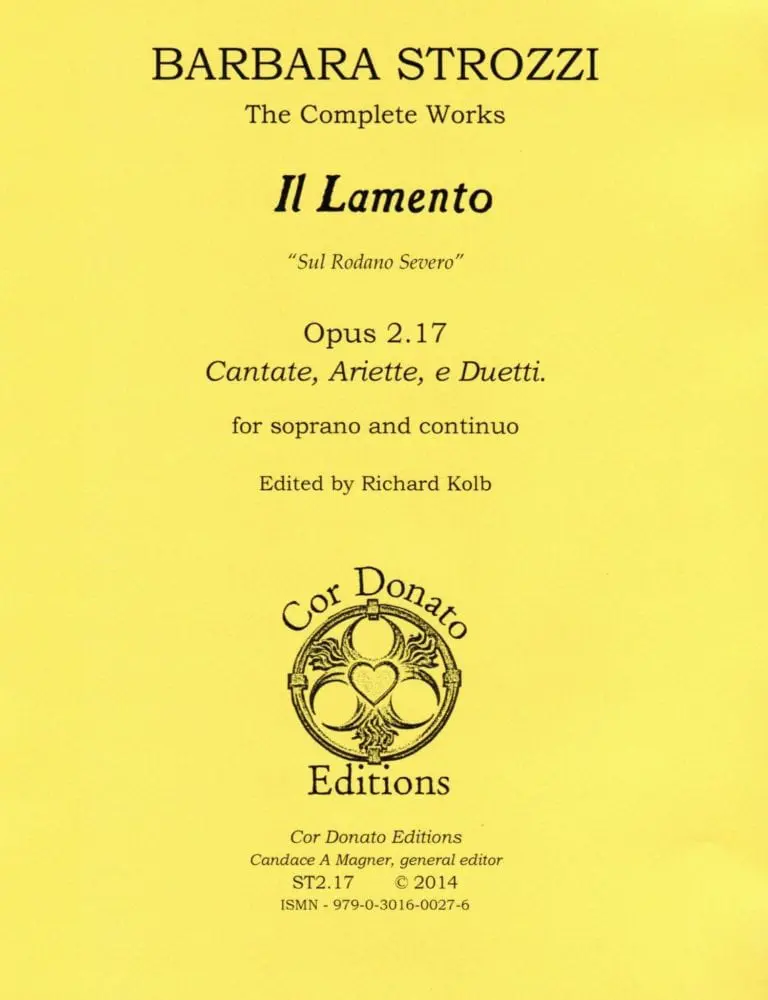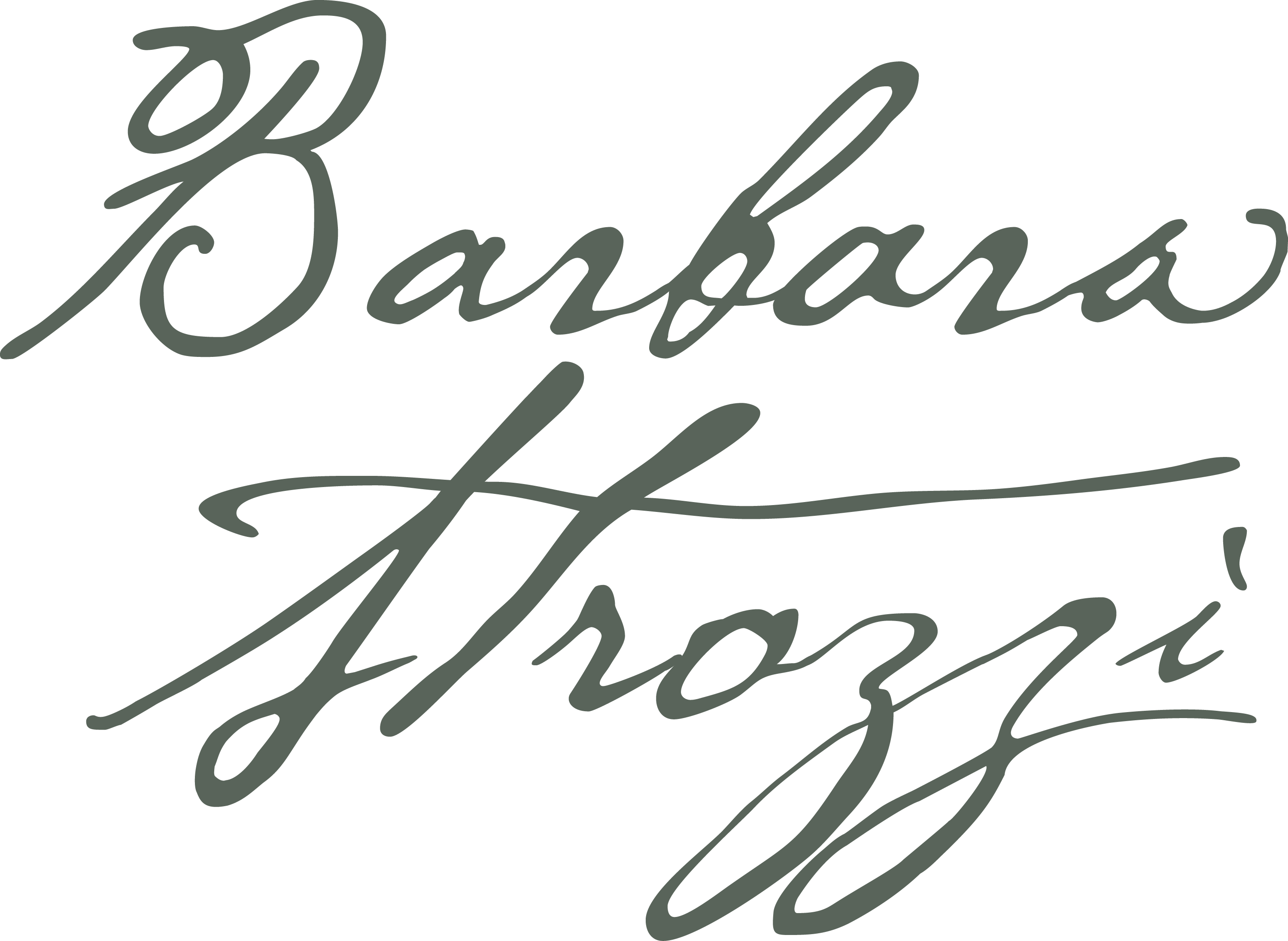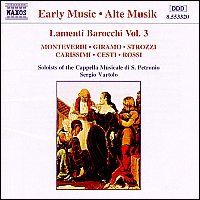✤ View another piece from this Opus / Collection →
Il Lamento
Original Language: Italian
Sul Rodano severo
giace tronco infelice
di Francia il gran scudiero,
e s'al corpo non lice
tornar di ossequio pieno
all'amato Parigi,
con la fredd'ombra almeno
il dolente garzon segue Luigi.
Enrico il bei, quasi annebbiato sole,
delle guance vezzose
cangiò le rose in pallide viole
e di funeste brine
macchiò l'oro del crine.
Lividi gl'occhi son, la tocca langue,
e sul latte del sen diluvia il sangue.
"Oh Dio, per qual cagione"
par che l'ombra gli dica
"sei frettoloso andato
a dichiarar un perfido, un fellone,
quel servo a te sì grato,
mentre, franzese Augusto,
di meritar procuri
il titolo di giusto?
Tu, se 'l mio fallo di gastigo è degno,
ohimè, ch'insieme insieme
dell' invidia che freme
vittima mi sacrifichi allo sdegno.
Non mi chiamo innocente:
purtroppo errai, purtroppo
ho me stesso tradito
a creder all'invito
di fortuna ridente.
Non mi chiamo innocente:
grand'aura di favori
rea la memoria fece
di così stolti errori,
un nembo dell'obblio
fu la cagion del precipizio mio.
Ma che dic'io? Tu, Sire - ah, chi nol vede?
tu sol, credendo troppo alla mia fede,
m'hai fatto in regia corte
bersaglio dell'invidia e reo di morte.
Mentre al devoto collo
tu mi stendevi quel cortese braccio,
allor mi davi il crollo,
allor tu m'apprestavi il ferro e 'l laccio.
Quando meco godevi
di trastullarti in solazzevol gioco,
allor l'esca accendevi
di mine cortigiane al chiuso foco.
Quella palla volante
che percoteva il tuo col braccio mio
dovea pur dirmi, oh Dio,
mia fortuna incostante.
Quando meco gioivi
di seguir cervo fuggitivo, allora
l'animal innocente
dai cani lacerato
figurava il mio stato,
esposto ai morsi di accanita gente.
Non condanno il mio re, no, d'altro errore
che di soverchio amore.
Di cinque macche illustri
notato era il mio nome,
ma degli emoli miei l'insidie industri
hanno di traditrice alla mia testa
data la marca sesta.
Ha l'invidia voluto
che, se colpevol sono,
escluso dal perdono
estinto ancora immantinente io cada;
col mio sangue ha saputo
de' suoi trionfi imporporar la strada.
Nella grazia del mio re
mentre in su troppo men vo,
di venir dietro al mio pie'
la fortuna si stancò,
Onde ho provato, ahi lasso,
come dal tutto al niente è un breve passo."
Luigi, a queste note
di voce che perdon supplice chiede,
timoroso si scuote
e del morto garzon la faccia vede.
Mentre il re col suo pianto
delle sue frette il pentimento accenna
tremò parigi e torbidossi Senna.
English
The Lament
By the pitiless Rhone
lies the hapless body
of France's noble squire,*
and though the body has not been allowed
the return with funereal honors
to his beloved Paris,
at least in his cold shade
the unfortunate youth attends Louis.
Like a clouded sun,
the fair Henry's rosy cheeks
are changed to pale violet,
and his golden hair
is stained with a deathly frost.
The eyes are livid, the mouth droops,
and blood flows upon his milky white breast.
"Oh God, why"
(the ghost seems to say)
"were you so hasty
to pronounce as a traitor, a felon,
that servant whom you esteemed so well,
while yet, Majesty of France,
you claim to deserve
the title of Just?
Even if my failing is worthy of punishment,
alas, together
with seething envy
you sacrificed me as a victim to anger.
"I do not claim innocence:
alas, I erred,
I betrayed myself,
trusting in the enticement
of smiling fortune.
I do not claim innocence:
A great halo of favor
is made culpable by the memory
of such foolish errors.
A fog of heedlessness
was the cause of my downfall.
"But what am I saying? You, Sire, ah, who doesn't
see it? You alone, believing too much in my loyalty,
made me in your royal court
a mark for envy and deserving of death.
"While about my devoted neck
you extended your gracious arm,
you also contrived my fall,
you consigned me to the sword and trap.
When you enjoyed yourself with me,
sporting in pleasant games,
you then ignited the tinder
of the courtiers' mines of hidden flame.
That flying ball,
hit by your arm and mine,
might well have told me, oh God,
of my shifting fortune.
"When we enjoyed
hunting together the fleeing deer,
the innocent beast
torn by the dogs
prefigured my state,
exposed to the bites of hound-like people.
I do not condemn my king of any fault
other than that of excessive Love.
"My name was distinguished
with five worthy honors;
but to my titles the connivance of deceivers
bestowed a sixth upon my head,
that of traitor.
Envy wished that,
if I were found guilty,
I should die instantly,
excluded from pardon.
With my blood, envy knew how
to redden the streets with her triumphs.
"While by the favor of my King
I ventured too high,
fortune tired of
following in my footsteps.
Thus I have learned, alas,
how from everything to nothing is but a tiny step."
Louis, at these words
of a voice that pleads for pardon,
trembles with fear
and gazes on the face of the dead youth.
While the King, with his tears,
shows remorse for his haste,
Paris trembles and the Seine becomes turbulent.
Translated by:
Richard Kolb
* Henri Coiffier de Ruzé d'Effiat, marquis de Cinq-Mars, (1620-1642), favorite of Louis XIII, conspired unsuccessfully to depose Richelieu, for which he was executed at Lyon on September 12, 1642.
Find the score...

Il Lamento
Published by Cor Donato Editions in historically correct modern transcription, including critical introductory notes on the work, editorial procedures, original texts with new English translations, and other contextual information about the piece.
Now available at CorDonatoEditions.com!
Purchase score →








